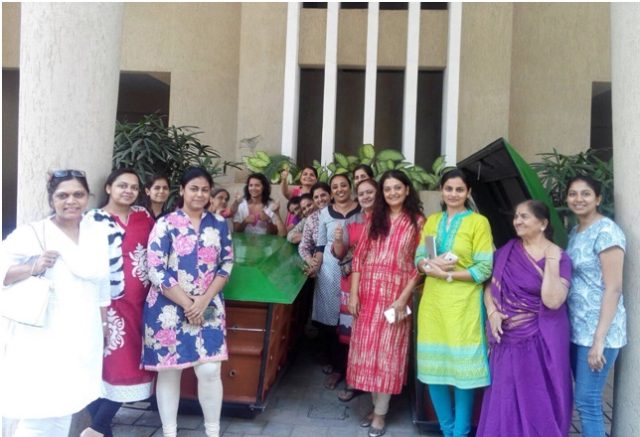- 20 women integrate to recycle approximately 7, 500 kg of total waste generated in the society
- 1, 511 kg of manure generated which is used in society garden
At a time when the city’s dumping ground are getting choked to capacity and the Brihnamumbai Municipal Corporation (BMC) has been hunting for a solution, a noble initiative by a group of 20 women from Marathon Onyx in Mulund and Marathon Group (Real estate developer) has a way out for this problem. After successfully recycling the waste generated in their society, the women have brought down the amount of waste sent to the dumping ground from 35kgs per day to almost nil.

The group has been able to implement this one of a kind measure through proactive participation from all its residents. The residents learnt about the program through Marathon Group, who in association with CREDAI MCHI have been implementing the latter’s Clean City Movement for the first time. Inspired by CREDAI National’s initiative under the Clean India program of Prime Minister Narendra Modiji, and by taking the assistance of CREDAI Kerala at Kochi, Marathon Group brought the initiative before the residents of the society. CREDAI Kerala at Kochi supported and provided guidance to the residents. Once the residents were informed about the importance of recycling waste, they happily supported the movement.
The program was led by Mrs Rakhee Mehta a resident of the society who first took lessons on waste recycling from a Kochi (Kerala) based organisation. As opposed to the conventional method of waste management using vermiculture; the organisation offers a twin Bio-bin system- an organic and sustainable way of managing waste.
Nearly completing a year since the program was first started, the society has been successfully generating 1511 kgs of manure from the total 4583 kgs of wet waste, which is 33 percent of the wet waste. 1020 kgs of dry waste that is generated is given away to be recycled. Only 5-6kgs of non-recyclable and non-bio degradable waste is sent to the dumping ground on a daily basis (which mainly includes sanitary waste like napkins and diapers).
“It’s not an easy task when a number of people are involved. The biggest task was in teaching the maids in the society the importance of segregation and to ensure they were doing their task correctly. But after days of practice, segregation has become a habit to them. Our house keeping staff in the society helps us in carrying out task post segregation,” Mrs. Mehta added.
The society used to earlier generate approximately 7,500 kg waste annually which was sent to dumping ground. Today after this initiative, the society hardly transports any waste to the dumping ground. Instead, the manure that is generated is used for the gardens and plants in the society. Instead, the manure that is generated is used for the gardens and plants in the society the dumping ground.
HOW DOES THE BIO-BIN SYSTEM WORK?
With proactive orientation of the residents towards proper segregation of domestic waste into wet (organic kitchen waste), dry (recyclable) waste and BMC waste (daipers and sanitary napkins) – Bio-bin system of waste management uses aerobic decomposition method. The daily wet waste is treated with a Bio-culture solution that consists of certain bacteria and fungi which speeds up the process of decomposition. By the end of 25 days, the waste is converted to an organic fertiliser.
Compared to conventional methods, Bio-bin system uses two containers made of durable Fibre Reinfroced Plastic (FRP) material,each of which can hold upto 400 kgs of kitchen waste. The bins are heat and rain ressistant and are provided with holes to ensure proper aeration.
Some of the advantages of this method are:
- It is easy to assemble and clean
- Processes waste at a faster speed
- It does not need lot of segregation
- Cooked food and non-vegetarian leftovers can be processed
- Citrus fruit peels need not be separated
- Since it uses microbes as per opportune recommendation the waste does not rot and give foul smell
- The city generates 9500 metric tons of waste daily
- The waste is dumped at Mulund dumping grounds and Deonar dumping ground, together 5200 metric tons of waste is dumped at these two sites daily
As per the Bombay High Court order, BMC cannot dump fresh waste at Deonar and Mulund from 30th June 2017
